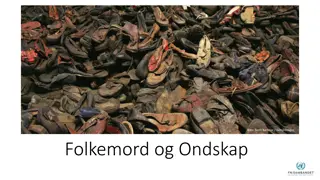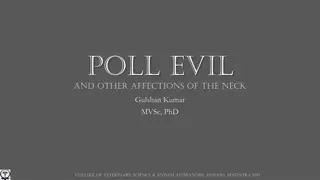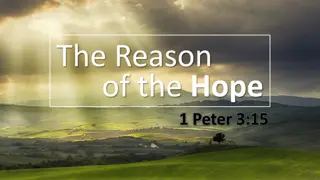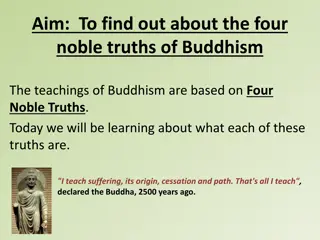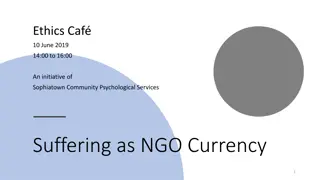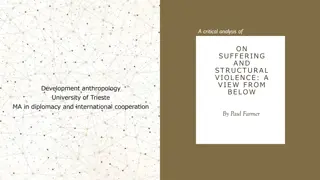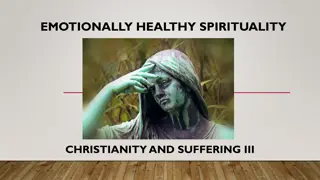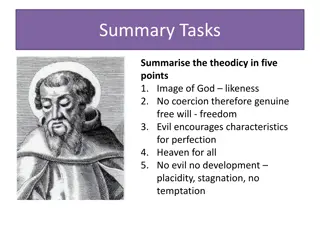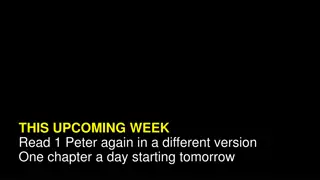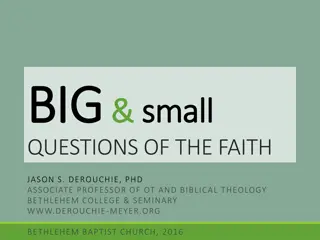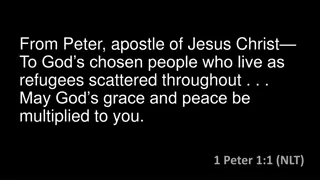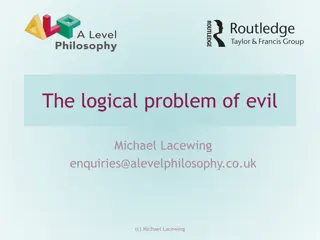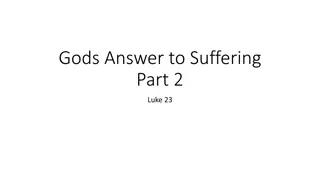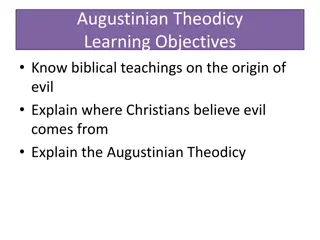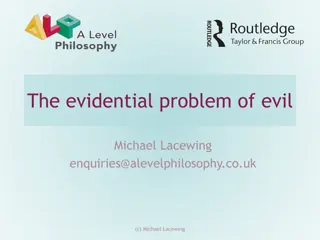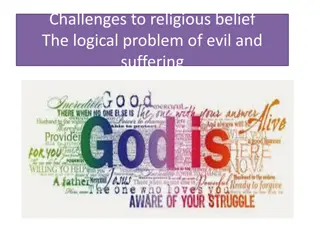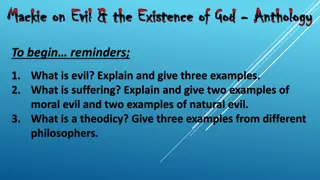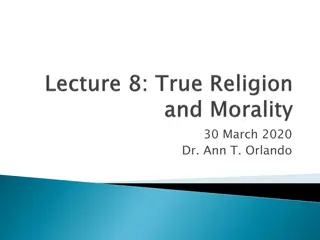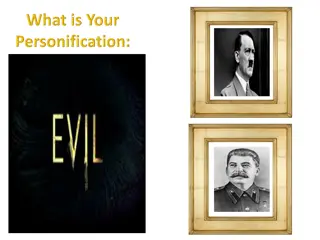Understanding the Problem of Evil and Suffering
Exploring the dual nature of evil (moral and natural) and the challenges it poses to belief in a benevolent deity. It delves into examples of evil and suffering, defines evil and its categories, discusses types of evil (moral and natural), and addresses the concept of natural evil.
Download Presentation

Please find below an Image/Link to download the presentation.
The content on the website is provided AS IS for your information and personal use only. It may not be sold, licensed, or shared on other websites without obtaining consent from the author. Download presentation by click this link. If you encounter any issues during the download, it is possible that the publisher has removed the file from their server.
E N D
Presentation Transcript
The Big Picture 2 a The problem of evil and suffering: The types of evil: moral (caused by free will agents) and natural (caused by nature). The logical problem of evil: classical (Epicurus) - the problem of suffering. J. L. Mackie s modern development - the nature of the problem of evil (inconsistent triad). William Rowe (intense human and animal suffering) and Gregory S. Paul (premature deaths).
1 Evil and suffering Must I can identify examples to illustrate the problem of evil and suffering Should I can explain the differences between natural and moral evil Could I can evaluate the challenge offered to belief in God by natural and moral evil
2. What is evil? Think, pair and share Write as a spider diagram Write up a definition using these ideas What ever is painful, malicious, disastrous Anything that is morally or physically harmful / wrong John Hick defined evil as physical pain, mental suffering and moral wickedness
The notion of evil will therefore include such categories as the bad, the unjust, the immoral, and the painful. An analysis of evil in this broad sense may proceed as follows: An event may be categorized as evil if it involves any of the following: some harm whether it be minor or great being done to the physical (pain) and/or psychological well-being (suffering) of a sentient (conscious) creature; the unjust treatment of some sentient creature; (prosperity of the wicked, demise of the virtuous) loss of opportunity resulting from premature death; anything that prevents an individual from leading a fulfilling and virtuous life; (e.g. poverty) a person doing that which is morally wrong; (immoral choices and acts)
Types of evil discussion What is natural evil? What is moral evil? Examples of moral and natural evil Natural evil Malfunctioning of the structure of the natural world Moral evil The result of deliberate human actions which are morally wrong
Natural Evil refers to form of evil and suffering which are not the direct result of free acts of human beings. There are several different areas which could be described as natural evil. Peter Vardy gives the following list in his work, The Puzzle of Evil: o Animal suffering o The suffering caused by natural disasters (floods, earthquakes, volcanoes) o Pain resulting from disease o Pain resulting from poor design of the human body (childbirth, degeneration) o Psychological illness We cannot reasonably claim that natural evil does not really exist we are all affected by it; there is empirical evidence of natural evil. This leaves believers with two possibilities, if they wish to maintain that God is omnipotent and all-loving. 1.Evil is the fault of humanity or the devil, and not of God; or 2.God created natural evil, and had a good reason for doing so.
PRIVATION: the loss or absence of a quality or attribute that is normally present. For example, cold is the privation of heat. Some philosophers, like Augustine and Aquinas, have argued that natural evil was not intended by God, but is a necessary inevitable part of the existence of good. Evil does not have a separate existence of its own, but is a falling away from goodness, a measure of the distance that something is away from perfection; a privation of good. All contingent beings have the capacity to be less than perfect (which is their true nature) and therefore evil is a necessary part of the contingent world. Aquinas stated that prior to the fall, evil did not exist for humans, and it will be eliminated in a heavenly future. Discussion Point Do you agree that evil is a privation of good? Or do you think that evil is a substance in and of itself?
Natural evil 1. Identity the examples of natural evil News footage of the Japanese Tsunami 2. Define natural evil 3. Why is it a problem for believers? 4. How might a theist explain the existence of natural evil?
Moral evil At the end of this section you will need too . . . 1. Define moral evil 2. How might a theist explain the existence of moral evil? 3. Is this an adequate response or is moral evil still a problem?
Moral Evil In contrast, moral evil is the kind which is caused by humanity. People deliberately inflict suffering on each other; they bully, steal, vandalise, terrorise and attack others. People are unfaithful, they lie and break promises sometimes they go so far as to cause their own pain; through drinking or smoking. Often theists will argue that this kind of suffering is clearly our fault, not God s. God is not forcing us to drink that 15th shot or lie to our friends; these are our own choices. God lovingly gave us freedom of choice when he made us, and we choose to do the wrong thing. This might seem like a fatal blow to the challenge of moral evil, but there are still difficulties with this position. Did God not know when He gave us free will that we would choose to do the wrong things? He is, after all, omniscient. Why did God create us with the ability and inclination to do wrong? He is capable of all things, so could have given us free will to only make good choices. And why does God not intervene when He sees wrong choices? Why choose to lead Moses out of Egypt but not lead the people of Hiroshima out of their city?
Why is giving us free will a loving thing to do? Imagine you are observing a family for a few weeks. Within the family there are two parents and two children, aged 11 and 14. The children are never allowed to make their own choices, the parents are in total control. This might seem like a good idea on the surface; they might choose to only ever eat sweets or go to an underage party. But what about making decisions like where to go, what to say and what to think? The children have no level of autonomy, every action of their lives is controlled by their parents. It is like a real life game of The Sims. Paired Discussion Talk with your partner about why it is more loving for God to give us free will. Write down notes of your discussion. God is like the parent. He loves us and wants the best for us, and so allows us complete free will. Yes, we might make decisions like only eating sweets or underage drinking, but we learn from these and grow as people. Free will is the most loving gift.
[The free will defence] only partly explains the suffering actually caused by human wickedness, for example, by a protracted and cruel war such as the world wars of our century or the war in Vietnam. Granted that these evils are brought about by human action, it remains the case that it is the nature of the physical world and the structure of conscious and sentient beings such as ourselves that render the consequences of evil actions so terrible. Part of the problem of evil is the fact that, the structure of our bodies, nerves and brains being what it is, physical and mental torture (as well as disease and accident) can take such horrific forms. Your Task 1. Read page 2 and explain what Hebblethwaite is saying here.
Three examples of moral evil Rwanda example- Brief history of Rwanda Colonial mistakes Genocide 100 days Machete Hutu Tutsi
Types of evil summary Moral Evil Where the actions of man cause suffering. Falling short of human purpose, given by God. The evil constituted by deliberate actions or negligent failure Swinburne Natural Evil Where the world appears to malfunction and events occur that appear out of our control. Natural evil is the evil that originates independently of human actions, in disease, in earthquakes, storms, droughts, tornadoes, etc. Hick Natural through Moral Evil Where what is apparently natural evil occurs, but does so owing to the action of humans e.g. the use of humans of CFCs which result in the hole in the Ozone layer. Whenman s disregard for his place in the natural order causes grievous physical harm to God s creation. Gina Akron Metaphysical Evil The term metaphysical evil was first used/coined by Leibniz and is the tracing back of all types of evil (moral and natural) to their ultimate cause. Evil is inevitable and is simply a part of our nature/world e.g. our limitation as human beings from life s outset.
Something to think about How often does natural evil occur, as the result of bad choices people make? Is there really such a thing as natural evil? Questions 1. How can natural evil be caused/made worse by humans? 2. Can a natural disaster be classed as evil?
Evaluation 1. What poses a bigger problem to belief in the God of Classical Theism; natural or moral evil?
Examples of evil and suffering Think of three examples of natural and moral evil Research three points about each one Add to the table on page 3


